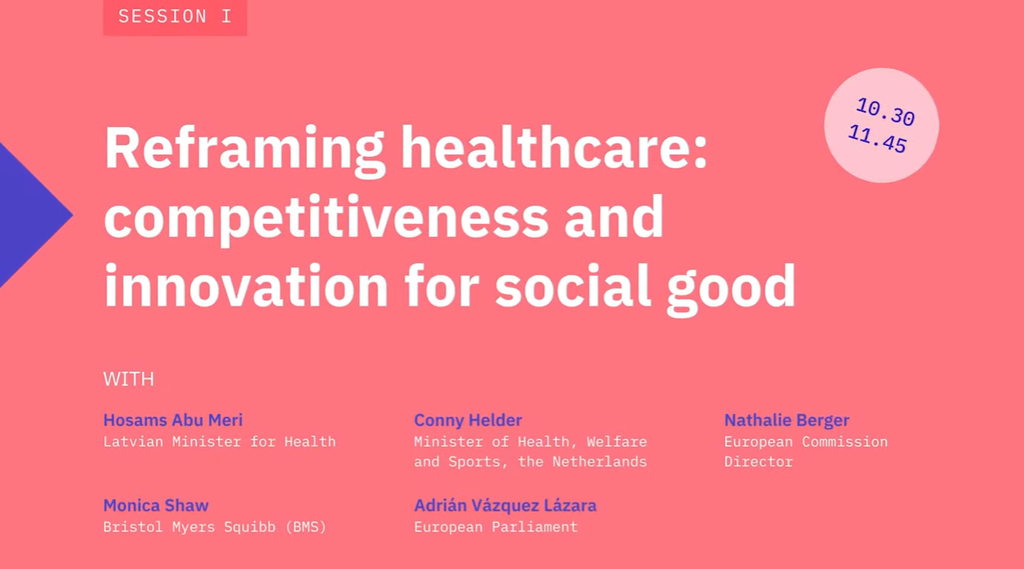Europe's moment: advancing clinical research and health innovation
Next event In person & online

- Area of Expertise
- Sustainable Livelihoods
Sustainable Livelihoods

Partner at McKinsey & Company and Leader of McKinsey’s Healthcare Informatics Group

Business Technology Consultant at McKinsey & Company
“We know that in healthcare we lag at least ten years behind virtually every other area in the implementation of IT solutions. We know […] that information technology applications can radically revolutionise and improve the way we do things,” wrote Toomas Hendrik Ilves, President of Estonia (2006-2016) and Chairman of the EU Task Force on eHealth.
This slow uptake manifests itself in various cancelled or delayed IT programmes across the EU, such as the UK’s National Programme for IT or Germany’s electronic health card. Throughout these projects, the complexities associated with achieving stakeholder buy-in, integrating legacy systems and managing security concerns led to significant cost overruns. This is particularly alarming given that health systems are struggling to reduce overall spending to deal with the demands of ageing populations.
The lag in introducing information technology in healthcare systems is also evident in digital health innovation. As in many areas of everyday life, consumers increasingly expect digital services to allow them to contact professionals, complete prescriptions and take care of themselves.
Digitisation is largely driven by health start-ups: flexible, patient-centric app developers with innovation in their DNA. But while there are more than 150,000 health and wellness apps available, only few achieve substantial numbers of downloads, make their way into standard care and fundamentally change the patient experience or deliver measurable benefits to the healthcare system.
What are the reasons for the slow progress in digitising healthcare?
First, there are substantial hurdles associated with bringing digital health innovations to life. As opposed to many other areas of healthcare, such as drugs or medical devices, there are no established pathways for introducing digital health innovations. As a first step, Germany’s medicines regulator, the Federal Institute for Drugs and Medical Devices (BfArM), has now published guidelines on when to classify apps as medical products.
Consumers increasingly expect digital services to allow them to contact professionals, complete prescriptions and take care of themselves
However, classification creates an avalanche of requirements in terms of data protection, security and appropriateness of medical recommendations. The associated costs, particularly in the light of insecure revenue prospects, create entry barriers and may impede innovation.
This links to a second reason for slow progress: the lack of sustainable business models. While start-ups attracted substantial venture capital funding of more than €3.5bn in the first half of 2016, the path to profitability is steep: customers across EU countries are used to social security systems that provide medical services free of charge, thereby limiting people’s willingness to pay for apps.
Other revenue sources are difficult to tap into, given the activity-based reimbursement schemes for healthcare providers in the EU. In Germany, a handful of apps have made their way into standard care through selective contracting with statutory health insurance. These apps include Tinnitracks for tinnitus relief or Caterna for amblyopia treatment. However, this does not yet represent a scalable basis for innovation.
A third and related reason is the questionable usefulness of digital health innovations. While it may improve patient experience to receive tailored advice and track health conditions, does it shape health outcomes?
Digital health start-ups often lack the resources to conduct costly and time-consuming evaluation studies to prove the usefulness of their innovations. To do so, they would need access to outcomes data, such as improvements in lab values like HBA1C for diabetes patients, or avoided hospitalisations. However, such data resides either within the IT systems of doctors or payers, to which start-ups do not have access, since they cannot prove their positive contribution to patient health. This fundamental chicken-and-egg problem is hard to resolve.
What can a potential solution look like?
A solution to this conundrum may be a radical shift in the fundamental approach to digital health: establishing an innovation ecosystem with a central platform at its heart. With Airbnb, Alibaba or Uber, this development is tightly embedded in a larger shift towards platform-enabled business models in the digital age. In healthcare, this open innovation platform may hold various kinds of patient data – at first, highly-standardised claims.
This data could then be made accessible to digital health start-ups through common application programming interfaces, with the respective health system, as the platform owner, remaining in control. Of course, basic features such as access, consent management and identity are indispensable to safeguard data security and maintain patient trust. In the end, this platform allows start-ups to responsibly address privacy and security challenges, and so may represent the foundational layer of an ecosystem of digital health services.
However, the full potential of this approach is unlocked only by coupling it with a shift towards outcomes-based reimbursement for healthcare providers. Outcomes-based reimbursement models are built on the fundamental premise that providers assume responsibility for their patients’ health while remaining cost-effective.
EU health systems should act sooner rather than later to enable innovators to build sustainable business models
Examples of such models are population-based or ‘total cost of care’ approaches that reward management and prevention of chronic conditions, episode-based approaches for acute or well-defined treatment pathways, or capitation-based approaches more generally.
Under these scenarios, providers may have an incentive to use digital health innovations to improve their patients’ care. At the same time, bringing together app activity and outcomes data allows providers to evaluate the usefulness of digital health innovations and share profits with successful innovators.
The opportunity needs to be seized now – a wait-and-see strategy is not an option. In the United States, outcomes-based reimbursement models are expanding rapidly. The Department of Health and Human Services aims to have 50% of Medicare payments in these models by 2018. The US Food and Drug Administration has long enacted guidelines for introducing medical apps onto the market. In this realm, existing digital champions and start-ups have already built strong positions and are now seeking opportunities to expand their footprint to the healthcare industry globally.
EU countries currently lag behind, both in terms of their reimbursement models and due to the traditionally more cautious approach to data protection and privacy. The open innovation platform caters to the desire to drive efficiency and outcomes, while allowing health systems to maintain control over the data. It so provides a useful solution to advance digital health innovation in the EU’s current political and regulatory climate.
EU health systems should act sooner rather than later. They need to consider developing open innovation platforms to enable data-sharing in the health system and move to outcomes-based reimbursement schemes. By doing so, they can enable innovators to build sustainable business models, while acting as a central gatekeeper in the system and maintaining control over data.
In the end, this radical shift provides a leap into a digital health ecosystem – finally an innovation that leads not to a higher cost, but to a more effective and efficient health system.
This article is part of Friends of Europe’s upcoming discussion paper ‘Disruptive models of healthcare for Europe’, which brings together the views of Friends of Europe’s large network of health professionals, policymakers, scholars and business representatives on disruptive innovation for health. This discussion paper closes a series of three high-level roundtables that Friends of Europe organised last year to examine the steps needed to create “disruptive models” for overhauling and improving healthcare systems across the EU.
Next event In person & online

Past event In person & livestreamed

Past event In person

Past event In person & livestreamed





Stay informed
We use cookies and similar technologies to adjust your preferences, analyze traffic and measure the effectiveness of our campaigns. Learn more about our privacy policy.